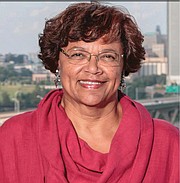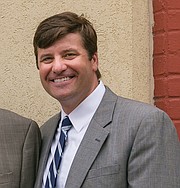Councilwoman to seek state help on Agelasto residency issue
Jeremy M. Lazarus | 12/28/2018, 6 a.m.
Parker C. Agelasto’s future as the 5th District representative on City Council apparently will depend on whether the General Assembly or another state entity gets involved.
Sixth District Councilwoman Ellen F. Robertson, who was rebuffed on her plans to introduce legislation to City Council seeking Mr. Agelasto’s removal from office because he no longer lives in the 5th District, said she plans to seek help at the state level, possibly through the General Assembly.
Ms. Roberston said she gave up the idea of local action after City Attorney Allen L. Jackson advised that “the council could not do this by ordinance as this was a matter that must be handled at the state level.”
The issue of Mr. Agelasto’s status has been on the front burner following his acknowledgement just before Thanksgiving that he and his wife purchased a larger home in the 4200 block of West Franklin Street during the summer and are now living there, outside of his district. Their home is located in the 1st District.
He and his family previously lived in the 1900 block of Floyd Avenue, within the 5th District.
Both the state Constitution and state law require state and local elected officials to live in the district they represent and to surrender their seat when they move.
Mr. Agelasto has said he would not seek re-election to a third term in 2020, but has declined to give up his seat before his current term ends in two years. He said he might return to his former residence, pointing to a 2014 attorney general’s opinion that an elected official’s move to another part of a locality would be legal if it were temporary.
At this point, no city official is able to challenge Mr. Agelasto on whether he should continue to serve as the 5th District representative. Richmond Voter Registrar Kirk Showalter, about the only city official other than the council with enforcement power, has rejected a complaint from three 5th District residents challenging Mr. Agelasto’s residency. In her response, she stated she is barred by state law from investigating Mr. Agelasto’s residency because he is not alleged to have moved out of the city.
And the city attorney’s official opinion appears to have iced the council, whose members have mostly remained mum on the issue. Council President Chris A. Hilbert, 3rd District, secured a written statement from Mr. Jackson that the issue of Mr. Agelasto’s residency was not an “appropriate matter” for him to consider or for the council to take up.
Ms. Robertson, however, plans to persist.
“My concern is the ward system that we fought to achieve and which must be maintained for the very reasons it was established” more than 40 years ago, she wrote to the Free Press.
“If council members are not required to live in the district represented, this nullifies the district requirement and potentially reverses equal representation,” she stated. “This is a major issue that must be addressed.”
Her words echo those of former City Councilman Henry W. “Chuck” Richardson, who gave the council and Mr. Agelasto a tongue-lashing on the matter at the council meeting on Dec. 17.
Mr. Richardson, who lives in and formerly represented the 5th District, was one of the three people who petitioned the city voter registrar about Mr. Agelasto’s residency.
Mr. Richardson recalled how Richmond City Council had long been dominated by white representatives from the West End when members were elected at large.
He also reminded the council that the city had annexed 23 square miles of Chesterfield County in 1969 in a bid to bolster the white population and block the election of more than two African-American representatives.
He noted that it took federal Voting Rights lawsuits and a ruling from the U.S. Supreme Court to bring about the current district system that ended at-large voting and enabled the city’s African-American voters to have an opportunity to elect candidates of their choice. As a result of the legal battles, the city secured in 1977 its first majority African-American City Council and its first African-American mayor, Henry L. Marsh III.
Mr. Richardson argued that Mr. Agelasto’s decision to remain on City Council without any penalty undermines the district system and puts the city on track to return to an at-large voting system.
“This undermines democracy,” Mr. Richardson said. While he called Mr. Agelasto a friend and excellent council member, Mr. Richardson said Mr. Agelasto “has to go.”
Despite his admiration for Mr. Agelasto, “I believe in democracy more,” he said.









